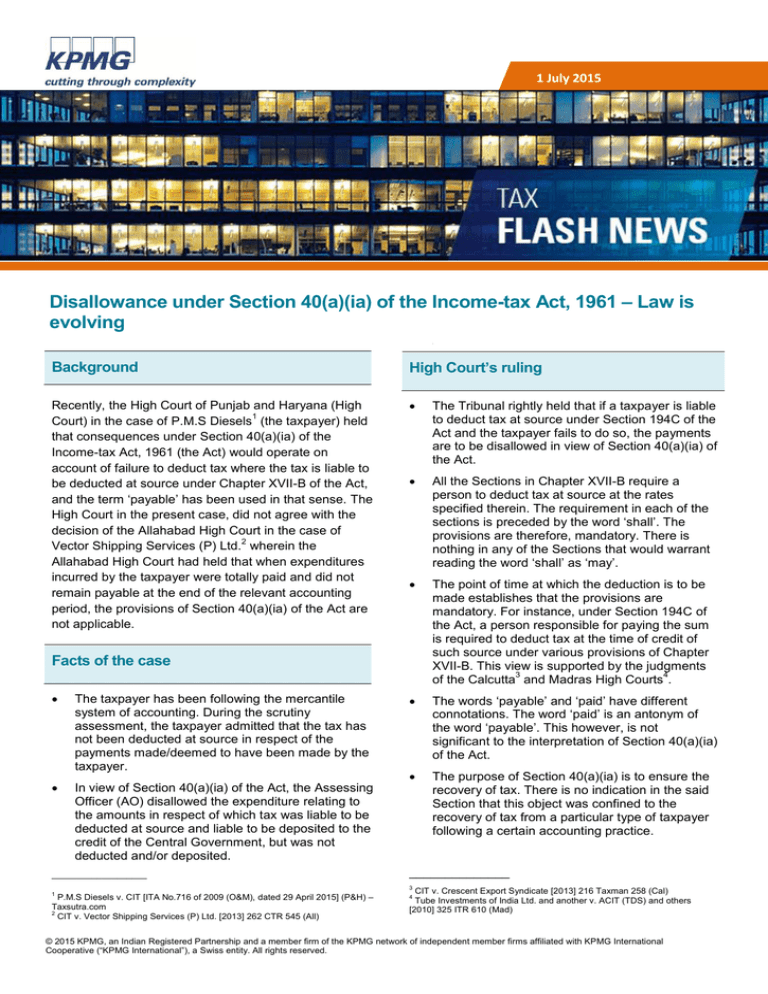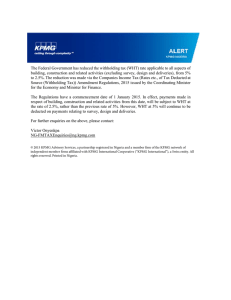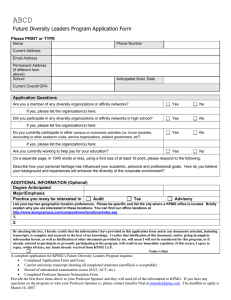
KPMG FLASH NEWS
KPMG in India
1 July 2015
Disallowance under Section 40(a)(ia) of the Income-tax Act, 1961 – Law is
evolving
Background
High Court’s ruling
Recently, the High Court of Punjab and Haryana (High
1
Court) in the case of P.M.S Diesels (the taxpayer) held
that consequences under Section 40(a)(ia) of the
Income-tax Act, 1961 (the Act) would operate on
account of failure to deduct tax where the tax is liable to
be deducted at source under Chapter XVII-B of the Act,
and the term ‘payable’ has been used in that sense. The
High Court in the present case, did not agree with the
decision of the Allahabad High Court in the case of
2
Vector Shipping Services (P) Ltd. wherein the
Allahabad High Court had held that when expenditures
incurred by the taxpayer were totally paid and did not
remain payable at the end of the relevant accounting
period, the provisions of Section 40(a)(ia) of the Act are
not applicable.
The Tribunal rightly held that if a taxpayer is liable
to deduct tax at source under Section 194C of the
Act and the taxpayer fails to do so, the payments
are to be disallowed in view of Section 40(a)(ia) of
the Act.
All the Sections in Chapter XVII-B require a
person to deduct tax at source at the rates
specified therein. The requirement in each of the
sections is preceded by the word ‘shall’. The
provisions are therefore, mandatory. There is
nothing in any of the Sections that would warrant
reading the word ‘shall’ as ‘may’.
The point of time at which the deduction is to be
made establishes that the provisions are
mandatory. For instance, under Section 194C of
the Act, a person responsible for paying the sum
is required to deduct tax at the time of credit of
such source under various provisions of Chapter
XVII-B. This view is supported by the judgments
3
4
of the Calcutta and Madras High Courts .
The words ‘payable’ and ‘paid’ have different
connotations. The word ‘paid’ is an antonym of
the word ‘payable’. This however, is not
significant to the interpretation of Section 40(a)(ia)
of the Act.
The purpose of Section 40(a)(ia) is to ensure the
recovery of tax. There is no indication in the said
Section that this object was confined to the
recovery of tax from a particular type of taxpayer
following a certain accounting practice.
Facts of the case
The taxpayer has been following the mercantile
system of accounting. During the scrutiny
assessment, the taxpayer admitted that the tax has
not been deducted at source in respect of the
payments made/deemed to have been made by the
taxpayer.
In view of Section 40(a)(ia) of the Act, the Assessing
Officer (AO) disallowed the expenditure relating to
the amounts in respect of which tax was liable to be
deducted at source and liable to be deposited to the
credit of the Central Government, but was not
deducted and/or deposited.
___________________
______________
3
1
P.M.S Diesels v. CIT [ITA No.716 of 2009 (O&M), dated 29 April 2015] (P&H) –
Taxsutra.com
2
CIT v. Vector Shipping Services (P) Ltd. [2013] 262 CTR 545 (All)
CIT v. Crescent Export Syndicate [2013] 216 Taxman 258 (Cal)
Tube Investments of India Ltd. and another v. ACIT (TDS) and others
[2010] 325 ITR 610 (Mad)
4
© 2015 KPMG, an Indian Registered Partnership and a member firm of the KPMG network of independent member firms affiliated with KPMG International
Cooperative (“KPMG International”), a Swiss entity. All rights reserved.
If for some reason, the government was interested in
ensuring the recovery of taxes only from taxpayers
following the mercantile system, it would be
expected that the provision stipulate clearly so, if not
expressly. It is not suggested that taxpayers
following the cash system are not liable to deduct tax
at source.
Adherence to the provisions ensures not only the
collection of tax but also enables the authorities to
bring within their fold all such persons who are liable
to come within the network of taxpayers. The
intention was to ensure the collection of tax
irrespective of the accounting system followed by the
taxpayers.
Accordingly, Section 40(a)(ia) applies not only to
taxpayers following the mercantile system but also to
taxpayers following the cash system.
The term ‘payable’ only indicates the type or nature
of payments by the taxpayers to the persons/payees
referred to in Section 40(a)(ia), such as contractors.
The consequences under Section 40(a)(ia) would
operate on account of failure to deduct tax where the
tax is liable to be deducted under the provisions of
the Act and in particular Chapter XVII-B thereof, and
the term ‘payable’ has been used in that sense.
The term ‘payable’ is descriptive of the payments
which attract the liability to deduct tax at source. It
does not categorise defaults on the basis of when
the payments are made to the payees of such
amounts, which attract the liability to deduct tax at
source.
If a taxpayer recovers the amount from the payee
subsequently, it would still constitute a deduction
from the amount payable to the payee. It would only
constitute a subsequent deduction.
The High Court in the present case, did not agree
with the decision of the Allahabad High Court in the
case of Vector Shipping Services (P) Ltd. wherein
the Allahabad High Court had held that when the
expenditure incurred by the taxpayer were totally
paid and did not remain payable at the end of the
relevant accounting period, the provisions of Section
40(a)(ia) are not applicable.
Subsequently, the Supreme Court dismissed the
department’s petition for a special leave to appeal.
However, the special leave petition was dismissed in
limine, without giving any reason, and therefore, the
dismissal did not confirm the view of the Allahabad
High Court, as held by the Supreme Court in various
5
case laws .
Our comments
The issue of disallowance of expenditure under
Section 40(a)(ia) of the Act has been a matter of
debate before the courts. The question is whether the
disallowance under Section 40(a)(ia) could be made
only in respect of such amounts which are payable as
on 31 March of the year under consideration or not.
The Special Bench of the Visakhapatnam Tribunal in
6
the case of Merilyn Shipping & Transports held that
the provisions of Section 40(a)(ia) of the Act are
applicable only to the amounts of expenditure
remaining unpaid as on 31 March every year and
that the said provision would not be attracted in case
the amounts have already been paid without
deducting tax.
Subsequently, the Calcutta High Court in the case of
Crescent Export Syndicates and the Gujarat High
7
Court in the case of Sikandarkhan N Tunvar , have
overruled the ratio laid down by the Special Bench
Tribunal in the case of Merilyn Shipping. On the other
hand, the Allahabad High Court in the case of Vector
Shipping Services (P) Ltd, without referring to the
decision of the Calcutta High Court and the Gujarat
High Court, has held that for disallowance of
expenditure on which tax has not been deducted, the
amount should be payable and not which has already
been paid by the end of the year.
In the present case, the High Court has held that the
consequences under Section 40(a)(ia) of the Act
would operate on account of failure to deduct tax
where the tax is liable to be deducted at source under
Chapter XVII-B of the Act and the term ‘payable’ has
been used in that sense. The High Court in the
present case, did not agree with the decision of the
Allahabad High Court in the case of Vector Shipping
Services (P) Ltd. wherein the Allahabad High Court
had held that when the expenditure incurred by the
taxpayer were totally paid and did not remain payable
at the end of the relevant accounting period, the
provisions of Section 40(a)(ia) are not applicable.
_________________
_________________
6
5
7
V.M. Salgaocar & Bros. (P) Ltd v. CIT [2000] 243 ITR 383 (SC), Supreme Court
Employees Welfare Association v. UOI [1989] 4 SCC 187 (SC)
Merilyn Shipping & Transports v. ACIT [2012] 20 taxmann.com 244 (Vis)
CIT v. Sikandarkhan N Tunvar [2013] 33 taxmann.com 133 (Guj)
© 2015 KPMG, an Indian Registered Partnership and a member firm of the KPMG network of independent member firms affiliated with KPMG International
Cooperative (“KPMG International”), a Swiss entity. All rights reserved.
www.kpmg.com/in
Ahmedabad
Commerce House V, 9th Floor,
902 & 903, Near Vodafone House,
Corporate Road,
Prahlad Nagar,
Ahmedabad – 380 051
Tel: +91 79 4040 2200
Fax: +91 79 4040 2244
Bengaluru
Maruthi Info-Tech Centre
11-12/1, Inner Ring Road
Koramangala, Bangalore 560 071
Tel: +91 80 3980 6000
Fax: +91 80 3980 6999
Chandigarh
SCO 22-23 (Ist Floor)
Sector 8C, Madhya Marg
Chandigarh 160 009
Tel: +91 172 393 5777/781
Fax: +91 172 393 5780
Chennai
No.10, Mahatma Gandhi Road
Nungambakkam
Chennai 600 034
Tel: +91 44 3914 5000
Fax: +91 44 3914 5999
Delhi
Building No.10, 8th Floor
DLF Cyber City, Phase II
Gurgaon, Haryana 122 002
Tel: +91 124 307 4000
Fax: +91 124 254 9101
Mumbai
Lodha Excelus, Apollo Mills
N. M. Joshi Marg
Mahalaxmi, Mumbai 400 011
Tel: +91 22 3989 6000
Fax: +91 22 3983 6000
Hyderabad
8-2-618/2
Reliance Humsafar, 4th Floor
Road No.11, Banjara Hills
Hyderabad 500 034
Tel: +91 40 3046 5000
Fax: +91 40 3046 5299
Noida
6th Floor, Tower A
Advant Navis Business Park
Plot No. 07, Sector 142
Noida Express Way
Noida 201 305
Tel: +91 0120 386 8000
Fax: +91 0120 386 8999
Kochi
Syama Business Center
3rd Floor, NH By Pass Road,
Vytilla, Kochi – 682019
Tel: +91 484 302 7000
Fax: +91 484 302 7001
Pune
703, Godrej Castlemaine
Bund Garden
Pune 411 001
Tel: +91 20 3050 4000
Fax: +91 20 3050 4010
Kolkata
Unit No. 603 – 604,
6th Floor, Tower – 1,
Godrej Waterside,
Sector – V, Salt Lake,
Kolkata 700 091
Tel: +91 33 44034000
Fax: +91 33 44034199
© 2015 KPMG, an Indian Registered Partnership and a member firm of the KPMG network of independent member firms affiliated with KPMG International
Cooperative (“KPMG International”), a Swiss entity. All rights reserved.


